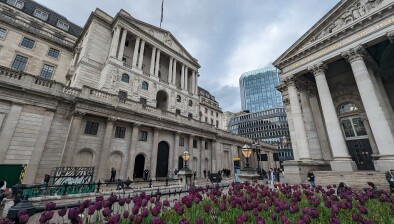UK economic downturn ‘less severe’ than expected but recovery will be slower, says BoE

The UK economic decline caused by the coronavirus pandemic will be less severe than first anticipated, however, recovery will also take longer, according to the latest data from the Bank of England (BoE).
The bank currently expects the UK’s economy to shrink by 9.5% this year. While this contraction would be the largest annual decline in 100 years, it is not as steep as the Bank’s initial estimate of a 14% contraction.
The BoE made the estimates as it announced it would hold interest rates at their all time low of 0.1%.
The bank said that recovery had been “earlier and more rapid” than it had initially assumed in May, reflecting a faster easing of lockdown restrictions than first expected.
However, the bank warned that unemployment would rise “materially” throughout the post-COVID crisis period. Unemployment is expected to almost double from the current rate of 3.9% to 7.5% at the end of the year as government-funded support schemes such as the furlough scheme come to an end in October.
Average earnings are also expected to shrink for the first time since the financial crisis.
The BoE said more workers faced a pay cut or freeze this year, adding: “In many cases, bonuses have been scaled back or withdrawn altogether for this year”.
The bank’s governor, Andrew Bailey said: “We have had a strong recovery in the last few months. The pace puts the economy ahead of where we thought it would be in May.”
The BoE said spending on clothing and household furnishings has now returned to pre-COVID levels, while consumers have continued to spending more on food and energy bills than before the lockdown.
However, Mr Bailey warned against reading too much into recent data. He said: “We don’t think the recent past is necessarily a good guide to the immediate future.”
The bank also warned that leisure spending and business investment remained subdued, which would weigh heavily on the UK’s economic recovery, BBC News reports.
The Bank of England reiterated that the UK still faced its sharpest recession on record, with the outlook for growth now “unusually uncertain”. The bank pects the UK economy to grow by 9% in 2021, and 3.5% in 2022, with the economy forecast to get back to its pre-COVID size at the end of 2021.
This compares with growth estimates of 15% and 3% respectively, set out by the BoE in May.
The bank’s latest forecasts are based on the assumption that there is no second wave of the virus and that there is a smooth transition to a new EU free trade agreement at the start of 2021.
Commenting on the holding of the base rate, Kevin Brown, savings specialist at Scottish Friendly, said: “On one hand, today’s announcement that the Bank of England base rate is being held at 0.1% isn’t much of a surprise.
“However, with economic uncertainty everywhere, speculation continues that interest rates could go into negative territory before the end of the year.
“That spectre looms large in the background and could serve as a tipping point for many cash savers to find ways to make their money work harder. Naturally many may consider investing as a better way to grow their money and reach their savings goals in the long-term.”
- Read all of our articles relating to COVID-19 here.






